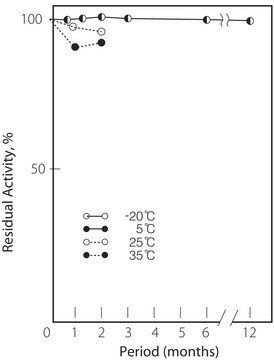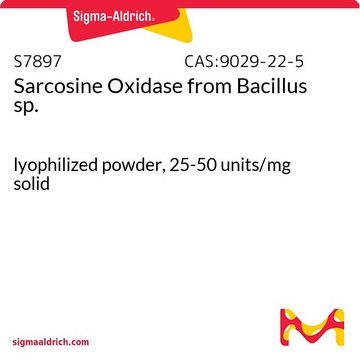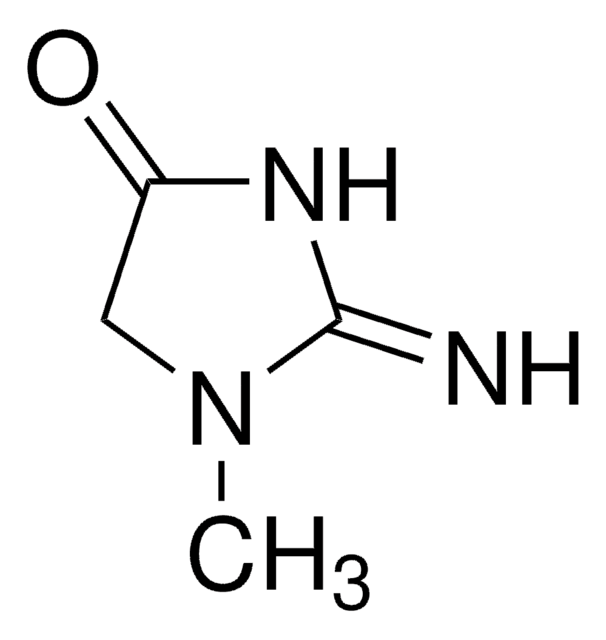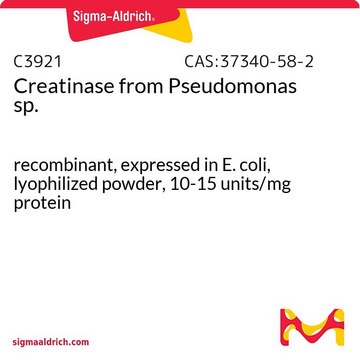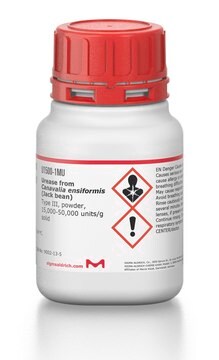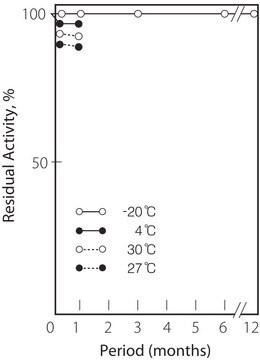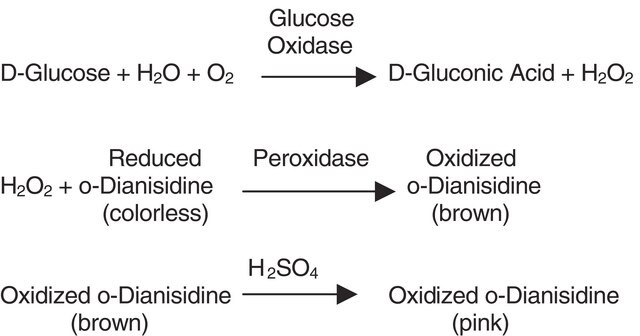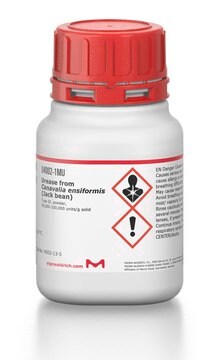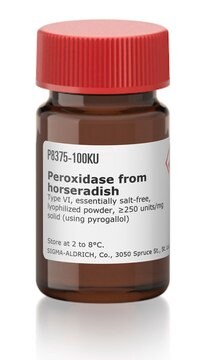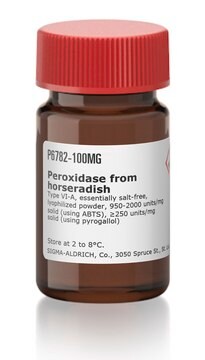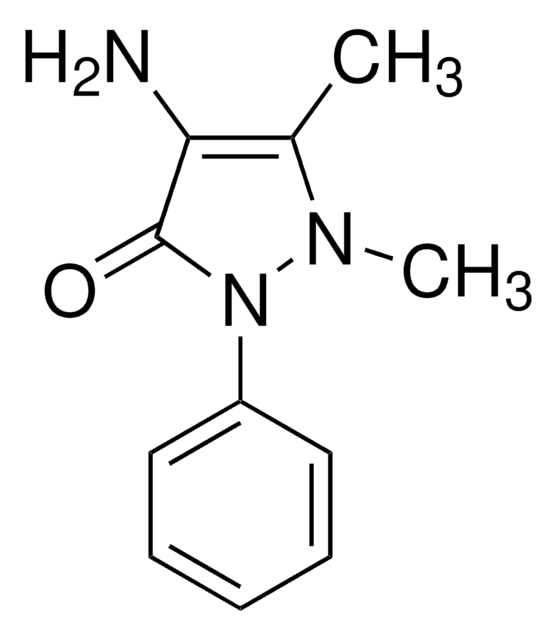C3172
Creatininase from microorganisms
lyophilized powder, 100-300 units/mg protein
Synonym(s):
Creatinine Amidohydrolase
Sign Into View Organizational & Contract Pricing
All Photos(6)
About This Item
Recommended Products
form
lyophilized powder
Quality Level
specific activity
100-300 units/mg protein
mol wt
~175 kDa
composition
Protein, 65-85%
foreign activity
Creatinase and urease ≤1%
Hexokinase and ATPase ≤0.1%
storage temp.
2-8°C
Application
Creatininase from microorganisms may be used in the preparation of amperometric biosensor by co-immobilization with other enzymes for the determination of creatinine.
This enzyme is useful for enzymatic determination of creatinine when coupled with creatine amidinohydrolase, sarcosine dehydrogenase or sarcosine oxidase and formaldehyde dehydrogenase in clinical analysis.
Biochem/physiol Actions
Creatininase from Pseudomonas sp. is a homohexameric enzyme with a molecular mass of 28.4 kDa per subunit. It is a cyclic amidohydrolase catalysing the reversible conversion of creatinine to creatine. Each monomer contains a binuclear zinc centre near the C termini of the β-strands and the N termini of the main α-helices. These zinc ions indicate the location of the active site.
Physical properties
Isoelectric point:4.7
Michaelis constants:3.2 x 10‾2M (Creatinine), 5.7 x 10‾2M (Creatine)
Structure:6 subunits per mol of enzyme (One mol of zinc is bound to each subunit)
Inhibitors:Ag+, Hg++, N-bromosuccinimide, EDTA
Optimum pH:6.5 − 7.5
Optimum temp:70°C
pH Stability:pH 7.5 − 9.0 (5°C, 16hr)
Thermal stability:Below 70°C (pH 7.5, 30 min)
Michaelis constants:3.2 x 10‾2M (Creatinine), 5.7 x 10‾2M (Creatine)
Structure:6 subunits per mol of enzyme (One mol of zinc is bound to each subunit)
Inhibitors:Ag+, Hg++, N-bromosuccinimide, EDTA
Optimum pH:6.5 − 7.5
Optimum temp:70°C
pH Stability:pH 7.5 − 9.0 (5°C, 16hr)
Thermal stability:Below 70°C (pH 7.5, 30 min)
Unit Definition
One unit will hydrolyze 1.0 μmole of creatinine to creatine per min at pH 8.0 and 25 °C
Physical form
Lyophilized powder containing sucrose and BSA as stabilizers
Analysis Note
Protein determined by biuret.
Signal Word
Danger
Hazard Statements
Precautionary Statements
Hazard Classifications
Resp. Sens. 1
Storage Class Code
11 - Combustible Solids
WGK
WGK 3
Flash Point(F)
Not applicable
Flash Point(C)
Not applicable
Personal Protective Equipment
dust mask type N95 (US), Eyeshields, Gloves
Certificates of Analysis (COA)
Search for Certificates of Analysis (COA) by entering the products Lot/Batch Number. Lot and Batch Numbers can be found on a product’s label following the words ‘Lot’ or ‘Batch’.
Already Own This Product?
Find documentation for the products that you have recently purchased in the Document Library.
Customers Also Viewed
Tadashi Yoshimoto et al.
Journal of molecular biology, 337(2), 399-416 (2004-03-09)
Creatininase from Pseudomonas putida is a member of the urease-related amidohydrolase superfamily. The crystal structure of the Mn-activated enzyme has been solved by the single isomorphous replacement method at 1.8A resolution. The structures of the native creatininase and the Mn-activated
Manoj Nahar et al.
Nanomedicine : nanotechnology, biology, and medicine, 4(3), 252-261 (2008-05-27)
Our aim in the present investigation was to develop a nanoparticulate carrier of amphotericin B (AmB) for controlled delivery as well as reduced toxicity. Nanoparticles of different gelatins (GNPs) (type A or B) were prepared by two-step desolvation method and
Chhanda Mallick et al.
Pancreas, 38(3), 322-329 (2009-01-27)
The study focused on the ability of the extracts of Musa paradisiaca and Coccinia indica on protein metabolic disorders in streptozotocin (STZ)-induced diabetes. Wistar strain rats were divided into 6 groups as control, control + composite extract treated, STZ-induced diabetes
Jason A Berberich et al.
Acta biomaterialia, 1(2), 193-199 (2006-05-17)
We describe the development of an extended use amperometric three-enzyme creatinine biosensor and the successful chemical modification and immobilization of the enzyme creatinine amidohydrolase using polyurethane prepolymers. Creatinine amidohydrolase is significantly stabilized by immobilization in polyurethane polymers. The half-life increases
Anne-Annette P Raso et al.
International journal of rheumatic diseases, 12(3), 243-249 (2010-04-09)
To determine the relationship of steroid use with tophus formation and other comorbid conditions among male gout patients. Review of medical records of Filipino gout patients under the care of rheumatologists was conducted. Univariate analysis (chi-square, Student's t-test) and multiple
Protocols
Assay Procedure for Creatininase
Our team of scientists has experience in all areas of research including Life Science, Material Science, Chemical Synthesis, Chromatography, Analytical and many others.
Contact Technical Service